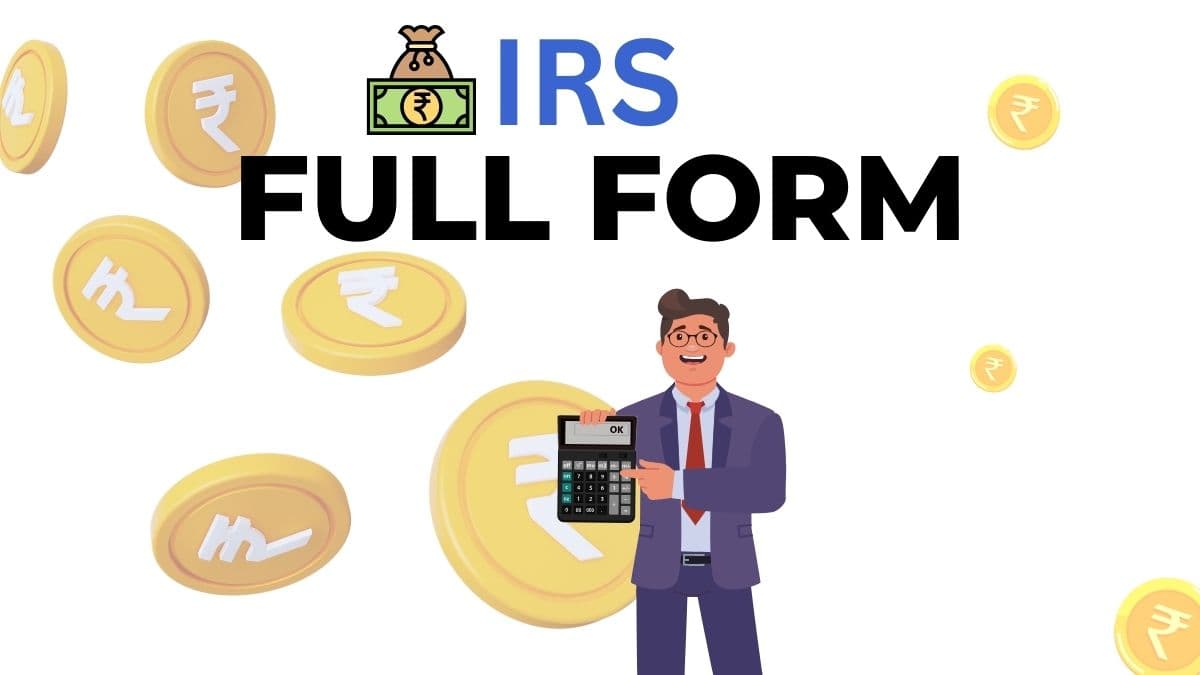What is the IRS Full Form?
By Pinkey Sharma |
Date 26-08-2024

Table of Contents
Admissions Open for
The IRS full form in English is the Indian Revenue Service. The acronym IRS is immediate and universal across the nation and is a part of the Indian civil services that is charged with the responsibility of administering direct and indirect taxes in the country of India. The IRS denotes the role it plays in fiscal management within the country to ensure the collection of revenues and enforcement of tax laws that would be required for running the government and for economic stability.
History of IRS
Having known the IRS full form, let us know about its history. IRS has a rich history dating back to the British colonial period. Incepted in the early 20th century, the British government set up a formal system of tax collection in India. It was then part of the Imperial Civil Service that included the administrative side branches and the different branches of perspectives. However, much before this, in 1922, the Indian Income Tax Act had been passed under which much more organized ways had already been created for collecting revenues, which were used to frame a basis that was one day to evolve into the IRS.
The IRS came into existence in 1953 post-independence based on the realization of the needs of the Indian state for appropriate administrative infrastructure for managing the growing economy. Since that time, the Service has been divided according to functional areas into two parts: the IRS (Income Tax) and the IRS (Customs and Central Excise). From time to time, the IRS has changed according to the need of the hour in respect of changes in the tax laws, changes in the economy, and administrative requirements in the country.
Eligibility Conditions to Take up IRS Examination
IRS officer is an honorable position, and thereby candidates need to meet the required eligibility criteria to appear in the same. UPSC has designed these eligibility criteria for different services, including IRS, as it conducts the CSE for recruitment purposes.
1. Educational Qualification: The candidate should have a graduate degree from any recognized university or equivalent. There are no restrictions on the course, thus making the examination accessible to candidates from all streams; be it science, arts, commerce, or engineering.
2. Age Limit: He/she must have attained the age of 21 years, but not have reached the age of 32 years as of the specified date for admission to IRS examination except in the case of a candidate belonging to the general category. There is an age relaxation for students of reserved categories: a 3-year relaxation in the OBC category and a 5-year relaxation in the SC/ST category.
3. Nationality: To be an IRS officer, one needs to be a citizen of India. However, in some cases, candidates might include persons coming from Nepal or Bhutan, or persons of Indian origin who have migrated from Pakistan, Burma, Sri Lanka, East African countries of Kenya, Uganda, the United Republic of Tanzania, Zambia, Malawi, Zaire, and Ethiopia, or Vietnam, with the intention of permanently settling in India.
4. Number of Attempts: In the general category, a candidate is allowed to have six attempts in order to clear the examination for the IRS. The number of attempts in the case of the OBC category is nine, but there is no limit for SC/ST, subject to the candidate meeting the age eligibility.
5. Physical and Medical Standards: Some physical and medical standards are required to be met for qualifying for candidature into the IRS. Such standards are required in the larger interest to ensure that the candidate meets the required level of physical fitness to attend to jobs that are in the open or require traveling to the field and many times happen away from one's working desk and involve intensive fieldwork apart from inspections and enforcement activities.
Primary Objectives of IRS
The IRS implements the Direct Taxes Code, Goods and Services Tax, and several other financial laws. The officers are involved in formulating the tax policy, enforcing the tax laws, and providing remedial measures to curb tax evasion. The growth of the IRS reflects the economic growth of India and the new challenges thrown up by the taxation system, proving the importance of the service to national governance.The Indian Revenue Service forms an intrinsic part of the governance and the economic stability of India; Here are some of the major goals that the IRS strives for:
1. Revenue Collection: This is the prime function of the IRS, through which the government collects its revenue. This includes management of direct taxes, such as income tax and corporate tax, and indirect taxes, including GST, customs, and excise duties. IRS officers collect the lion's share of this revenue, which will be utilized for financing public services, infrastructure projects, and other government activities.
2. Policy Implementation: They are responsible for the actual implementation of tax policies as framed by the Government. This includes ensuring that the administration is fair and equitable to all under tax laws in a uniform manner across the country. They also participate in the actual formulation of policy by suggesting ways and means of reframing the tax regime in the light of changes in the economy and fiscal requirements.
3. Taxpayer Services: IRS would provide taxpayers with effective and transparent service. This would help taxpayers meet their obligations of the tax with ease, improve taxpayer education and deliver other services such as tax refunds in a timely manner. Taxpayer experience is at the core of the theory that motivates the IRS. The goal is voluntary compliance and administration trust with the federal tax system.
4. Curbing Tax Evasion: The basic mission of the IRS is to catch and curb tax evasion. The IRS officers go about inspecting, investigating, and raiding for unaccounted money to bring it into the mainstream of taxation. Combat or curb of evasion would ensure integrity of the tax base and to see that all pay their due towards the nation's development.
5. Economic Intelligence and Enforcement: It undertakes a predominant role in the field of gathering economic intelligence of the country—encompassing monitoring its financial transactions and investigation of cases of money laundering—in coordination with other agencies that are responsible to ward off illegal economic activities. The enforcement actions by the IRS ensure the 'rule of law' and present a strong deterrent against economic crimes.
6. Facilitating Economic Growth: By maintaining a steady and predictable tax system, the IRS ensures an enabling environment for economic growth. It includes the facilitation of trade, businesses, and investments with a view to streamlining the tax system in a manner that is not only equitable but also efficient.
IRS Regional Offices
The Indian Revenue Service follows a decentralized mode of operation, with the different regional offices set up throughout the country. There is a strong element of decentralization within the regional offices involved in the adherence to tax laws at the local level and satisfactorily providing services to the taxpayers in areas where they are asked to make decisions on compliance with the tax code.
1. Regional Offices of Income Tax: The IRS (Income Tax) is divided almost in all regions, each headed by his region by a Chief Commissioner of Income Tax (CCIT). All these region offices control and administer income tax in their respective regions. They control all the work of subordinate offices like Income Tax Offices and Assessment units responsible for coming directly into contact with the total taxpaying public.
2. Customs and GST Regional Offices: The IRS (Customs and Central Excise) functions through its regional offices, dealing with the collection of indirect taxes that incorporate GST, customs, and excise taxes. These offices are charged with the task of assessment and collection of taxes, enforcement of the provisions of the tax laws, and facilitation of trade. They operate in conjunction with other government agencies to ensure the proper running of customs clearance at respective ports and airports.
3. Enforcement Directorates: Apart from the regional offices, the IRS has specialized enforcement directorates like DRI and ED, that take responsibility for investigating economic crimes, monitoring cross-border financial transactions, and enforcing compliance with international trade laws.
The regional decentralization allows the IRS to cater to regional needs and concerns while maintaining a national consistency standard in their tax administration.
Examinations Conducted for IRS
The IRS does not independently conduct its own exams. Recruitment to the IRS is made through the Civil Services Examination (CSE) conducted by the Union Public Service Commission. The CSE is one of the most competitive examinations for testing a candidate's knowledge, analytical abilities, and suitability for a career in the civil services in India.
The recruitment process consists of three stages:
1. Preliminary Exam: Preliminary Examination is the first stage of the test, consisting of two objective-type papers: General Studies Paper I and General Studies Paper II (CSAT) Prelims is a screening test, and the candidates need to clear it to be qualified for the Main Examination.
2. Main Examination: This examination is more expanded than the preliminary one and constitutes nine papers. These nine papers include essays, general studies, and one optional subject decided upon by the candidate. The Main Examination is designed to test the candidate on various subjects in detail and writing skills, but above all, it measures the analysis of issues of complexity by the candidate.
3. Personality Test (Interview): The Objective of the CSE is the final stage in the overall process and is a Personality Test, commonly called an Interview. This is where the personality of the candidate, his communication skills, and general suitability for a career in civil services are tested.
Candidates clearing successfully all three stages of the examination are selected for the various services including IRS. The final allocation to IRS or the other services will be based on the rank of a candidate, his/her preferences, and the vacancies available at that time.
Conclusion
The IRS full form marks the beginning for an IRS officer. The Indian Revenue Service is one of the cornerstones of public administration in India and is responsible for the very important task of collection of revenues due to the Government of India, and enforcement of the tax laws. The IRS Board, the IRS full form in English, the abbreviation of IRS command respect for integrity, efficiency, and commitment to public service.
The IRS officers are entrusted with huge responsibilities concerning policies, their implementation, revenue collection, checking tax evasions, and encouragement of economic growth. Their work directly influences the government's ability to finance public services, develop infrastructure, and support overall economic development.
The service's commitment to excellence in tax administration and adaptability toward newer challenges will help it continue to play a key role in India's public administration.
FAQs
1. Can a 12th Pass Apply for IRS?
No, a 12th pass cannot apply directly for the IRS. Candidates must have at least a graduation degree from a recognized university to become eligible for the IRS examination.
2. What is IRS Qualification?
The minimum educational qualification for the IRS is a bachelor's degree from an authorized university. Other required qualifications include meeting the criteria for age and nationality and passing the Civil Services Examination, which is held under the aegis of the UPSC.
3. How Many Subjects are in the IRS?
The examination will be conducted as part of the Civil Services Examination. The IRS examination tests widely on various topics. There's a Main Examination paper that includes General Studies, an essay paper, and one optional subject that the candidate has to choose, covering the fields of economics, history, and geography or public administration.
4. Is the “IRS full form” asked in any examination?
Yes. In many competitive examinations, General Knowledge Tests, Quiz Contests, Government Interviews, Objective tests, etc. the “IRS full form” is asked.
Liked what you read? Feel free to share this article with your friends and spread the knowledge on “IRS Full Form”.
Also Read,
JEE Full Form: JEE (Joint Entrance Examination) is India’s top engineering entrance exam for institutes like IITs and NITs
Other Related Sections
NCERT Solutions | Sample Papers | CBSE SYLLABUS| Calculators | Converters | Stories For Kids | Poems for Kids| Learning Concepts | Practice Worksheets | Formulas | Blogs | Parent Resource
CBSE Schools In Popular Cities
- CBSE Schools in Bangalore
- CBSE Schools in Mumbai
- CBSE Schools in Pune
- CBSE Schools in Hyderabad
- CBSE Schools in Chennai
- CBSE Schools in Gurgaon
- CBSE Schools in Kolkata
- CBSE Schools in Indore
- CBSE Schools in Sonipat
- CBSE Schools in Delhi
- CBSE Schools in Rohtak
- CBSE Schools in Bhopal
- CBSE Schools in Aurangabad
- CBSE Schools in Jabalpur
- CBSE Schools in Jaipur
- CBSE Schools in Jodhpur
- CBSE Schools in Nagpur
- CBSE Schools in Ahmednagar
- CBSE School In Tumkur

Call Us to know more about Orchids
Swipe Up

















